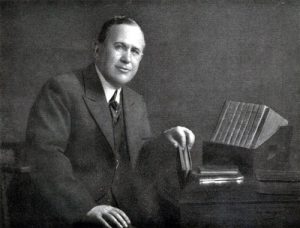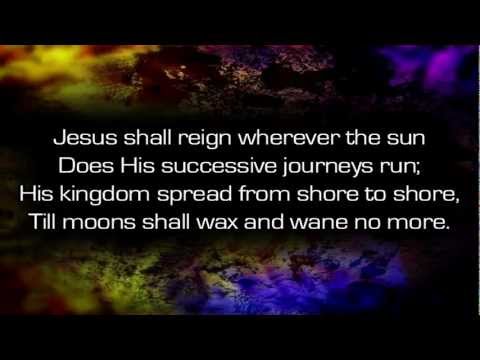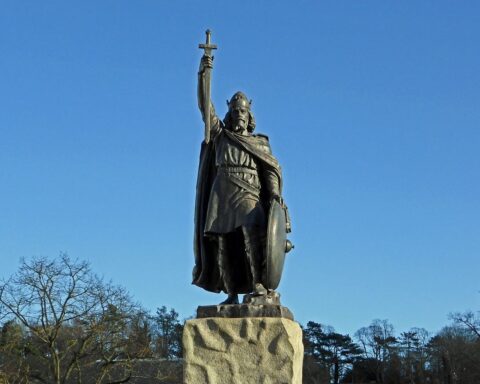Editor’s Note: Sermon preached by J. Stuart Holden (1874-1934).
“He that is not with Me is against Me.”
—Matt. 12:30
THERE is something bewildering in the endless variety of Christ’s character. The many-sidedness and withal the perfect symmetry of His life has always puzzled men even while it persuaded them. At one time He is the Man of gentleness, calling the weary and heavy-laden with a voice which thrills with sympathy and is irresistible in its wooing winsomeness. At another time He is the Man of sternness, denouncing insincerity with a voice now vibrant with passion, and flashing the light of a pure indignation upon all that is unholy and untrue. At one time it is His lowliness, and at another His loftiness which sets Him forth in compelling vividness as “not of this world.” At one time the closeness of His intimacy with common men and their interests invests Him with a magnetic attraction to which all hearts respond; while at another His remoteness and unapproachableness inspire with a sense of reverent awe those who venture nigh.
 And yet despite all, or perhaps because of all the perplexing variations of His revealed nature there is a something about Christ which seems to harmonize these apparent contradictions into one unique perfection. In Nature the many-hued rays unite in forming the bright beam of light, and what at first seem mutually contradictory are discovered as being in reality mutually complementary. So is it in Christ. The conjunction of apparently irreconcilable qualities in a beauty which is the light and life of men, goes far to attest the reality alike of His humanity and His divinity. Without these mystifying anti-theses which abound in Him it would be hard to recognize Him as fulfilling His own claims. The preciousness and fairness of a jewel is only discerned by means of its many facets; and new brilliance and beauty only break forth as the gem is held at changing angles to the light.
And yet despite all, or perhaps because of all the perplexing variations of His revealed nature there is a something about Christ which seems to harmonize these apparent contradictions into one unique perfection. In Nature the many-hued rays unite in forming the bright beam of light, and what at first seem mutually contradictory are discovered as being in reality mutually complementary. So is it in Christ. The conjunction of apparently irreconcilable qualities in a beauty which is the light and life of men, goes far to attest the reality alike of His humanity and His divinity. Without these mystifying anti-theses which abound in Him it would be hard to recognize Him as fulfilling His own claims. The preciousness and fairness of a jewel is only discerned by means of its many facets; and new brilliance and beauty only break forth as the gem is held at changing angles to the light.
It is with the desire of new and enriching discovery in Christ that we think upon the quality of intolerance which, though often overlooked by His people, nevertheless, characterized in marked fashion all His life and work for men; and is of deep and real significance to us all. For He changes not with the fleeting years.
Now at first sight the use of such a word as intolerance to describe Christ is almost repugnant to us. It sounds harsh; for we are accustomed to think of Him as of One so full of love as to be without asperities of any kind. Of broader mind and more charitable judgment than any who preceded or who have succeeded Him, can it be that we find anything akin to intolerance in Him? Is He not too large and generous to have aught of the smallness of mind by which we usually identify the intolerant man today? Is not the divine nature too ample to admit of what at any time seems petulant and impatient? For we do not usually commend intolerance as being the quality of the truly great. On the contrary, we rather pity the man who is so small as to be intolerant of all but his own views and his own order, and who intolerantly excludes and condemns those who are not in agreement with him. And in this we do well. For nothing is so unseemly and unlovely as an intolerant man, who is commonly but an ignorant one.
But herein lies the essential difference between the intolerance of Christ and of all others most of all of His professed disciples. Their intolerance is the expression of imperfect and fragmentary knowledge. His is the intolerance of One Who knows! He knows the why and wherefore of the mission on which He has been sent by the Father. He knows the subtlety and strength of the sin which He has come to combat for and in men. He knows the wide range of possibility in every life to which He makes appeal, the full value of the capacity and aptitude which He seeks to deliver from the grip of destructive forces. He knows the grieved love of the sadly-wronged God, and the yearning of the Father-heart over the alienated affection of the deceived child. And, knowing all this, He would be less than divine were He not intolerant of all that arrays itself against God’s purpose of recovery and deliverance, of all that binds and blinds men to their true life, of all that impairs and incapacitates them, of all that deceives and denies them, of all that outrages the love which is everlasting in its patience and faith.
Then, His intolerance is not only the expression of His knowledge but of His love. It were impossible to think of Him as the true lover of men, apart from just this unaccommodating austerity, which at all times declares absolute truth in its tonic bitterness. There is an intolerance in moral and spiritual issues, which is the only possible voice by which love can declare itself, and by which truth can win recognition for itself. And this is the intolerance of the Son of God. The scientist is inspired to intolerance in his unresting fight with the deadly disease-germs, just because he knows the virulence of the foe, and wants to benefit man kind by its complete conquest. Were he more tolerant he would be less benevolent. The artist is intolerant of ugliness and discord by reason of the fine sensibilities of his nature. He feels with an exquisite pain anything which outrages the canons of beauty and taste. Hence his protests, often it is to be feared ineffectual despite their sincerity. But notwithstanding his failure to secure a popular verdict, he must lift up his voice and declare the faith that is in him; for intolerance is part of his nature, and is of the very essence of his art. The statesman too(as distinguished from the mere politician) is intolerant of anything which threatens or imperils his country; and we applaud the rare self-sacrificing service by which his intolerance makes itself known.
Indeed, less than intolerance, when the issue involved affects adversely the life of the nation, would be treachery. And just as their intolerance attests the reality and worth of these and many others who could similarly be cited, so the intolerance which is everywhere discernible in Christ goes far to proclaim His divinity. It is seen, for instance, in the high claims which He makes for Himself. “I am the Bread of Life”; “I am the Light of the World”; “I am the Way, the Truth, and the Life.” That He can make such claim without any loss of modesty or show of mere egotism, that He can so declare Himself without any toleration of possible rival, is expressive of an undisturbed consciousness of divinity in short, that He has indeed come from God to men, and that He is God s full and final word to them. His quiet and altogether seemly intolerance with regard to His own office and work, is the unfaltering Evangel, that
“God hath other words for other worlds;
But for this world the Word of God is Christ.”
How intolerant, too, is He in the commands which He lays upon men. “Seek ye first the kingdom of God “; and again, “If any man come unto Me and hate not his father and mother, and wife and children, and brethren and sisters, yea, and his own life also, he cannot be My disciple”; and again, “Follow thou Me.” He would save men from self-love which is self-destruction; from absorption in the deteriorating lower things of life, into which it is so easy to fall, and from which it is so hard to rise; from devotion to even the best things of which the human heart is capable, but which, unrelated to the central governing affection for which we have been made, make for our undoing; and from the worship of idols which tend to become ideals, bringing the whole of life under their sway. And only an intolerant demand for whole-hearted allegiance and discipleship could be an effective Gospel unto such a redemption. He cannot be Lord at all if He is not Lord of all.
The same intolerance marks His imposition of self-discipline upon His followers. “If thine eye offend thee, pluck it out and cast it from thee. If thine hand offend thee, cut it off and cast it from thee.” Sin is the enemy ; and, in respect of it, any toleration is at once disloyal and disastrous. And conscience and memory unite in confirmation of this His intolerance, hailing it as being the only effective way of dealing with sin s defiling enslavements. Were Christ to be in any degree less intolerant in the matter of sin, or to impose a less harsh and rigorous discipline upon those who would follow Him, conscience would shrink from accepting Him. For there is that within every man in regard to his own sin which, at any rate in his best moments (and never let us forget that it is then we are most truly ourselves), shrinks and recoils from any thing like temporizing or excusing of the wilful transgression. Nothing but the drastic, the radical, the intolerant, can ever satisfy the clamant need of the human soul in its sin-created agony. It turns from any cheap and easy way of peace with an instinctive refusal which is self-protective. It is drawn to Christ by the intolerant conditions upon which alone His power of deliverance may be known.
But it is, perhaps, most conspicuously in His discriminating division of men that this spirit and quality is seen in Christ. He banishes all uncertainty and disposes of all ambiguity and that for all time in declaring that “he that is not with Me is against Me.” In moral issues mere neutrality is quite impossible; and it is of the very nature of love to make this indubitably clear. Nor can this issue be evaded. Men must take sides when brought within the zone of Christ s compelling personality and mission. There is always “a division among the people because of Him.” For while there is so much in Christ to quicken love and stimulate faith, there is always much to stagger the unwilling and unready. The intolerance which brooked no dissuasion from the pathway of redeeming sacrifice; which turned a deaf ear to affectionate entreaty, and with steadfast face set out on the pilgrimage of the Cross, nor rested until all was accomplished, now seeks the highest place in the hearts of men. For this is the intolerance of a hungering love. Obviously it is destructive of self-interest, of sinful affection, of unholy thought and action, of worldly compliance, and of all that is frequently found in usurpation of the throne of God in the lives of men. The issue is thus always between self-will and the will of God.
And it is self-determined. We either actively range ourselves with Christ in His attitude toward these things, or passively declare ourselves against Him. We crown Him or crucify Him. And it is our spiritual sympathies which pronounce upon us. He does not judge us by our mental assent to the articles of a creed. As a matter of fact, He formulated no creed; for no creed could fully define Him, nor sufficiently express His intent and power. Nor does He judge us by our allegiance to a system of belief or worship. As a matter of fact, He imposed no system; for no system could contain or convey a grace boundless as the ocean and limitless as the universe. No! He simply says that the one who is not with Him in all the active sympathies of life, not in living agreement with His programme, nor in loyal co-operation with His power, is against Him.
Of course it would not be true to assume that He does not recognize the limitations of present apprehension of Him. At best we know but “in part.” But we know! And to be untrue to our measure of knowledge, to be unwilling to follow as far as we see the footprints before us, to withhold the allegiance which is the logical outcome of our present recognition of Him, is to write ourselves down as ” against ” Him. For He does not admit the existence of any via media. How much does the present day need to to be reminded of this divine intolerance? We are in danger of imagining that our often superficial interest in the external things of the kingdom of God is all that is needed of us; and of deluding ourselves that our shallow judgments are a sufficient justification for conduct which contradicts the Christian ethic. An easy familiarity with certain phases of the Gospel has bred in us a sort of contemptuous tolerance of its implications. We do not fear for ourselves, nor tremble at the approach of sin, as in earlier days. Indeed, we have successfully banished the idea of sin from our theology and our scheme of things. Formerly men thought themselves too bad to approach God. To-day they regard themselves as being too good to need Him.
Once He was omnipotent. Now He is merely negligible. Popular imagination, as far as it is exercised at all with regard to Him, conceives God as One Whose love is to be looked for in His kindly indulgence of human frailty, and Whose benign kindness and good nature accepts any kind of homage. We are in deadly peril of drugging ourselves into the very sleep of death by drinking in, as though it were the Water of Life, a distorted idea of His graciousness. As though this was His only quality! We forget the jealousy of a love which said of old, “Thou shalt have none other gods but Me.” And there is, perhaps, nothing so calculated to arouse and sting us into a true understanding of things as this word of Christ s intolerance, “He that is not with Me is against Me.” As the sleeper in the snow is rudely awakened by his rescuer, whose violent methods, at first resented by the disturbed slumberer, afterwards evoke his gratitude, so does Christ force us to face the facts of our life and His.
And how searching is His test! What a striking answer to all merely artificial pose in regard to His claims is given in this word of His intolerance! It is the vogue amongst a certain class of people to-day to profess a non-committal attitude toward Christ, as though they were in some uncertainty as to His reality, and as though the scales of their moral judgment had not yet swung in His favour. They imagine themselves to be in a neutral position with not a little complacent superiority. Christ, however, intolerant of anything insincere and pretentious, plainly declares that not ” with ” Him, such ones are “against” Him. There is a pathetic folly in imagining ourselves to be judging Christ, when all the time He is actually judging us, and when our lives are faithfully recording the judgment.
A story is told of one of a party of visitors to a great continental gallery, who expressed himself in all ignorance as thinking but little of the priceless pictures on the walls. He freely criticized them aloud; thought they were vastly overrated; that they were but ugly old things; only made artificially valuable by mere sentiment, and the like. To all of which the guide quietly responded, “Sir, you perhaps do not know that it is not the pictures which are on their trial; it is the visitors! And so with men and Christ. Every day of our lives is really a judgment-day, which reveals the hidden man of the heart, and records his determining attitude toward the Son of Man.
What a surprise many of us would get did we but see something of the work of our own influence. For influence is one of life s unquestioned forces, always silently operative, and accomplishing results for good or evil far beyond our conception. We are always starting or strengthening in other lives impulses whose issues are eternal, for ” no man liveth unto himself.” Our personal relationship with Christ by no means ends with our own destiny; and one of the startling discoveries of eternity will be of the share we have had in forming or deforming other lives. Those with whom we are constantly coming into contact are in many cases taking their impressions of Christ from our reflection of Him, and adopting our attitude toward His Evangel as their own. Hence the force of Christ s contention that the man who is not avowedly “with” Him is “against” Him and be it said, “against” Him to an undreamt-of degree. Let us not forget, on the other hand, that the one who is indeed “with” Him in the entire consecration of a life which His love has redeemed, shares a partnership of power which re-enforces every activity and multiplies every effort; so that his life becomes, beyond all imagining, useful and fruitful unto the greatest glory of God. “Against” Him, our every day but lays up eternal blame and shame. “With” Him, we ourselves are transformed into something of His likeness, receive something of His contagious passion, and ourselves acquire redemptive values in the work of His kingdom. As He deals with such latent and actual possibilities, is it to be wondered at that we find in Christ this strain of intolerance? Is it not true to say that were He not intolerant He would not be divine? And does not His in tolerance shed for us all a new and transfiguring light upon the methods by which He has ever sought to bring us to Himself? His unspeakable love is the interpretation of His mystifying providence, and the greatness of His purposes the justification of His intolerant Gospel.
Let us see to it that we meet His claim with a responsive intolerance which for bids the withholding of aught that He savingly demands of us. For this is the genius of “the life that is life indeed.” And they that are “with Him are called and chosen and faithful.”









